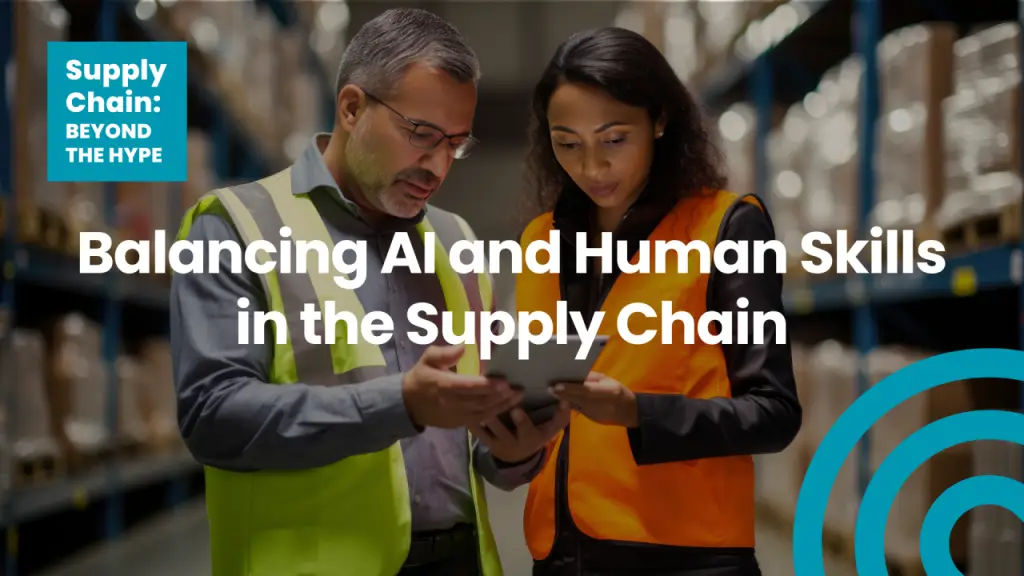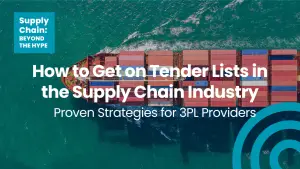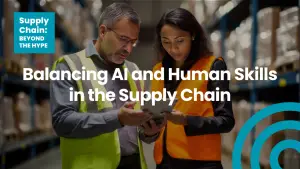The Intersection of technology and human skills
The integration of AI in the Supply Chain in recent years has revolutionised the industry, enhanced efficiency, and optimised operations across the board. However, while technology is a critical enabler, as a Supply Chain Consultant working with some of the world’s largest brands, I believe the human element remains irreplaceable.
This was a hot topic at the recent SCALA Discussion Forum that I hosted with speakers highlighting the importance of managing change effectively and engaging employees as AI is integrated into Supply Chain operations.
The Supply Chain sector still heavily relies on strong interpersonal relationships and human skills such as curiosity, collaboration, and creativity – all critical traits that massively enhance a business’s capability.
In edition one of my Linkedin newsletter, “Supply Chain: Beyond the Hype”, I explored the impact of AI on the Supply Chain. In this latest edition of my newsletter, I’ll explore the interplay between AI and human talent, emphasising the importance of fostering human skills in a technology-driven Supply Chain environment.
THE CHALLENGE: Attracting and retaining talent in a tech-driven environment
Current talent shortages
The Supply Chain industry is experiencing a significant talent shortage affecting both blue-collar and white-collar roles. Good-quality warehouse workers, truck drivers, demand planners, and logistics coordinators are all in high demand, yet the industry seems to struggle to attract and retain sufficient numbers.
Factors contributing to the talent gap
Several factors contribute to this talent gap. A primary issue is the perception of the Supply Chain industry as low-tech and labour-intensive, which can deter potential candidates. Additionally, competitive labour markets mean that other sectors, particularly tech, offer more attractive salaries and benefits, making it harder for the Supply Chain industry to compete.
THE IMPACT: How automation and AI are transforming roles
Automation in blue-collar roles
Automation technologies, such as robotics and autonomous vehicles, have been revolutionising blue-collar roles within the Supply Chain for some time. These advancements increase efficiency and reduce operational costs, but they also raise concerns about job displacement and the future of traditional labour roles.
AI in desk-based roles
AI and machine learning are becoming indispensable in desk-based roles. These technologies can analyse vast datasets, predict demand patterns, and optimise inventory levels, enabling Supply Chain professionals to make more accurate and timely decisions. However, this shift requires a new set of skills focused on data analysis and strategic thinking.
THE CRITICAL HUMAN FACTOR: Why human skills matter more than ever
Irreplaceable human skills
While AI can process data and perform repetitive tasks, it cannot replicate human intuition, empathy, or the ability to build relationships. These ‘soft skills’ are crucial for strategic decision-making, managing supplier and customer relationships, and driving innovation within the Supply Chain.
Real-world examples
For instance, negotiating a complex contract with a supplier or resolving a logistics crisis requires more than just data; it requires the human touch. The ability to understand context, read emotional cues, and navigate nuanced conversations are skills that technology cannot replicate.
The Human Edge
I thoroughly recommend you read “The Human Edge” by Greg Orme. In his book, he explores how humans can stay relevant in the age of AI. He suggests that success is about harnessing unique human qualities such as creativity, empathy and curiosity – all traits that AI struggles with but humans can leverage to stand out.
THE SOLUTION: Balancing technology with human expertise
Integrating AI thoughtfully
The key to leveraging AI in the Supply Chain is to use it as a tool that enhances human capabilities rather than replaces them. AI should be seen as a partner that helps supply chain professionals make better decisions, not as a replacement for human judgment.
Fostering human skills
To achieve this balance, organisations need to invest in training programs that enhance both technical and soft skills. Employees should be equipped to use AI tools and understand the insights they provide and how to apply them strategically.
Ethical AI use
It’s also essential to address ethical considerations, such as data privacy and potential biases in AI algorithms. Ensuring transparency and accountability in AI use is crucial for maintaining trust and integrity within the industry.
BUILDING TRUST: Managing change and engaging employees
Transparent communication
Successful AI implementation depends on building trust among employees. Transparent communication about AI’s role and benefits is essential. Employees need to understand how AI will impact their roles and the advantages it brings to the organisation.
Involving employees
Involving employees in the AI implementation process helps ensure they feel valued and part of the transition. This can be achieved through regular updates, feedback sessions, and decision-making processes related to AI integration.
Effective change management
Change management strategies are critical. This includes offering training programs, continuous engagement, and providing support as employees adapt to new technologies. A well-managed change process helps mitigate resistance and fosters a culture of innovation and collaboration.
ENHANCING WORK ENVIRONMENTS: Improving facilities for better retention
The current state of facilities
The quality of facilities in warehouses and truck stops plays a significant role in worker satisfaction and retention. Unfortunately, many facilities are outdated, with inadequate amenities and safety concerns, leading to low morale and high turnover rates.
Necessary improvements
The Supply Chain industry must invest in upgrading facilities to attract and retain talent. This includes enhancing safety measures, providing better amenities, and creating a more comfortable and supportive working environment. Improved facilities can significantly boost worker morale, increase productivity, and reduce turnover rates.
THE OUTCOME: Creating a sustainable and attractive Supply Chain sector
Benefits of a balanced approach
A balanced approach that leverages both technology and human talent leads to a more resilient and innovative Supply Chain. By integrating AI thoughtfully and fostering human skills, organisations can enhance efficiency, improve decision-making, and drive growth.
Long-term success
Investing in talent development and improving facilities not only addresses current challenges but also ensures long-term sustainability. A focus on both technology and human capabilities creates a Supply Chain sector that is attractive to new talent and prepared for future challenges.
WHAT NEXT?: Investing in people for the future of Supply Chain
Industry stakeholder responsibilities
Industry stakeholders must recognise the value of human skills and invest in their development. This includes providing training programs, improving working conditions, and promoting a collaborative approach to technology adoption.
Promoting a dual approach
By embracing a dual approach that leverages both AI and human talent, the Supply Chain industry can overcome current challenges and build a resilient, future-ready workforce. This balanced strategy ensures the sector remains competitive, innovative, and sustainable.
SUMMING UP: The future of Supply Chain – A harmonious blend of AI and human talent
The future of the Supply Chain industry lies in the harmonious blend of AI and human skills. While technology can significantly enhance operational efficiency and decision-making, the human element remains irreplaceable. By investing in talent development, improving facilities, and fostering a culture of collaboration and innovation, the Supply Chain industry can navigate the complexities of modern operations and ensure sustainable growth.
Chris’s final thoughts
The Supply Chain industry must focus on creating a balanced ecosystem where technology and human skills complement each other. This approach will address current challenges and pave the way for a more dynamic and resilient future. Industry leaders should commit to this vision, ensuring the Supply Chain remains a vital and thriving part of the global economy.




